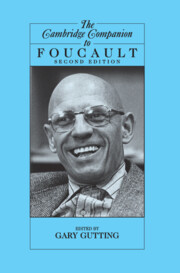Book contents
- Frontmatter
- Introduction Michel Foucault: A User’s Manual
- 1 Foucault’s Mapping of History
- 2 Foucault and the History of Madness
- 3 The Death of Man, or Exhaustion of the Cogito?
- 4 Power/Knowledge
- 5 Ethics as Ascetics: Foucault, the History of Ethics, and Ancient Thought
- 6 Michel Foucault’s Ethical Imagination
- 7 The Analytic of Finitude and the History of Subjectivity
- 8 Foucault’s Encounter with Heidegger and Nietzsche
- 9 Foucault and Habermas
- 10 Foucault’s Relation to Phenomenology
- 11 Against Interiority: Foucault’s Struggle with Psychoanalysis
- 12 Foucault’s Modernism
- 13 Queering Foucault and the Subject of Feminism
- Bibliography
- Addendum to Bibliography, 1993–2005
- Index
9 - Foucault and Habermas
Published online by Cambridge University Press: 28 August 2006
- Frontmatter
- Introduction Michel Foucault: A User’s Manual
- 1 Foucault’s Mapping of History
- 2 Foucault and the History of Madness
- 3 The Death of Man, or Exhaustion of the Cogito?
- 4 Power/Knowledge
- 5 Ethics as Ascetics: Foucault, the History of Ethics, and Ancient Thought
- 6 Michel Foucault’s Ethical Imagination
- 7 The Analytic of Finitude and the History of Subjectivity
- 8 Foucault’s Encounter with Heidegger and Nietzsche
- 9 Foucault and Habermas
- 10 Foucault’s Relation to Phenomenology
- 11 Against Interiority: Foucault’s Struggle with Psychoanalysis
- 12 Foucault’s Modernism
- 13 Queering Foucault and the Subject of Feminism
- Bibliography
- Addendum to Bibliography, 1993–2005
- Index
Summary
I confess a deep reluctance to commenting on Foucault in light of his astute observation that commentaries only “say what has already been said and repeat tirelessly what was nevertheless never said.” How much truer this is when the commentator proposes to repeat an earlier commentary, as I propose to do here.
The vanity of my undertaking will, I hope, be offset by the modesty of my aim: to revisit the debate between Foucault and Habermas in order to dispel the notion that they are engaged in incompatible rather than complementary acts of social critique. Accepted wisdom has it that Foucault is an anti-humanist who rejects the emancipatory ideals of the Enlightenment. Habermas, by contrast, is portrayed as the arch defender of those ideals. Again, “common knowledge” holds that Foucault is a historical relativist with strong “anarchist” leanings, whereas Habermas is a “transcendental” philosopher in the Kantian vein engaged in rationally deducing universal and necessary norms.
In truth, both are humanists – despite their divergent takes on the philosophical coherence of humanism. Both readily accede to the value of such things as rights and democratic institutions in shaping and protecting modern critical aptitudes, and both accept the ambivalent nature of rights and democratic institutions in simultaneously constraining and enabling individual acts of non-conformism and resistance. Where they principally differ is on their choice of priorities: Foucault can be understood as a modern-day virtue ethicist fighting to liberate the capacity of individual self-choice and personal self-formation from oppressive conformism, whereas Habermas can be seen as a political theorist concerned with justifying and promoting a more just conception of democracy based upon an ethics of discourse.
- Type
- Chapter
- Information
- The Cambridge Companion to Foucault , pp. 240 - 283Publisher: Cambridge University PressPrint publication year: 2005
- 6
- Cited by



